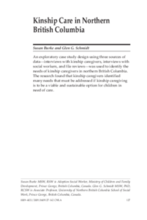An exploratory case study design was used to identify the needs of kinship caregivers in northern British Columbia (BC). Interviews were conducted with 16 individual kinship caregivers and 11 of their social workers. Data was also gathered from reviews of the children’s and the birth parents’ files. Grandparents comprised the largest number of caregivers (7) and there was also one great-grandparent. Caregivers were between 37 and 68 years of age, and all primary caregivers were women. Many of the caregivers said that they were erroneously told the children would be in their home only for a short period. They felt that there were undue expectations placed on them by the child welfare system. These expectations frequently centered on parent-child contact, specifically around providing supervision and transportation to and from visits. As in all caregiver/child relationships, the health and well-being of each caregiver directly impacted the level of care and therefore the safety and well-being of the children in the home. All of the caregivers said that they needed additional supports which included respite, funding for children’s activities, training, and social worker support. Social workers indicated that they preferred kinship care to placing the children in a foster home but put special emphasis on the extra work involved.

